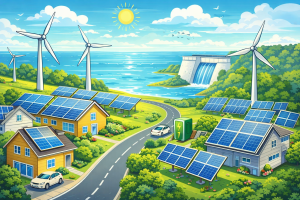Jakarta – Director General of New Renewable Energy and Energy Conservation (EBTKE) at the Ministry of Energy and Mineral Resources, Eniya Listiani Dewi, emphasised the critical role of the transportation sector in Indonesia’s energy transition roadmap.
“The government, together with strategic state-owned enterprises, continues to accelerate the energy transition in transportation. Not only through biofuels, but also through the acceleration of the battery-based electric vehicle (KBLBB) ecosystem,” said Eniya at the EITS Discussion Series 2025 event on Wednesday, September 10.
According to Eniya, collaborative cross-sector measures are a must, given that transportation still accounts for a large portion of national energy emissions. She explained that biofuel development programs cannot be separated from vehicle electrification. The two complement each other in reducing emissions while strengthening energy independence.
“If we rely on only one source, the transition will be slow. With the synergy of biofuels, electric vehicles, and hydrogen and ammonia research, we can build a greener transportation ecosystem that is faster and more measurable,” he explained.
A discussion event entitled “What’s New in Energy Transition in the Transportation Sector” was held on Wednesday, September 10, organised by the Energy Institute for Transition (EITS), a nonprofit organisation in the fields of education, training, energy and mineral resources, and media management.
The discussion highlighted the transportation sector’s role as one of the key determinants of the national energy transition’s success. To accelerate decarbonization in this sector, the integration of biofuels with vehicle electrification is seen as key, along with the exploration of new technologies such as hydrogen and ammonia.
Supporting the net-zero target
The EITS Discussion Series 2025 highlighted that transportation is one of the priority sectors in achieving the 2060 Net Zero Emission (NZE) target. Regulatory support, incentives, and public participation are determining factors for the energy roadmap to be fully realised.
“Collaboration between the government, state-owned enterprises, the private sector, and the community is the bridge to NZE. All parties must take part, either through the adoption of electric vehicles or the use of low-carbon fuels,” Eniya emphasised.
The government has encouraged the implementation of biofuels such as B35 and B40, while expanding the electric vehicle charging station ecosystem in various major cities. At the same time, research into the use of hydrogen for transportation is also being trialled as a long-term alternative.
Eniya believes that a combination of policy, technology, and innovation is the foundation for ensuring that the energy transition in the transportation sector not only reduces emissions but also opens up new investment opportunities. (Hartatik)
Banner photo: Scharfsinn/shutterstock.com















